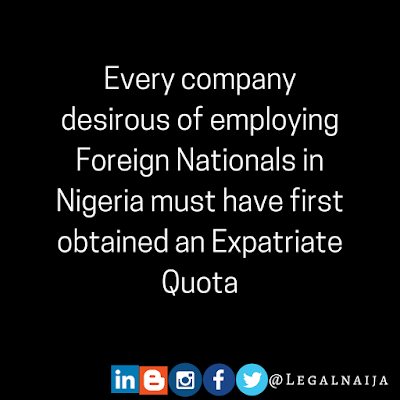
An Overview of Executive Order N0. 5 preventing foreigners from obtaining jobs Nigerians can do

An Executive Order (EO) is a rule or an
official statement issued by the President to an executive branch of the
government about how the federal agencies are to use their resources.
Executive Orders have the force of law.
official statement issued by the President to an executive branch of the
government about how the federal agencies are to use their resources.
Executive Orders have the force of law.
The issuance of an EO by the President
is not equivalent to the creation of a new law or the performance of
legislative functions; it is the instruction by the President to the government
on how the latter is to work within the parameters that have already been set
out through legislation and the Constitution.
is not equivalent to the creation of a new law or the performance of
legislative functions; it is the instruction by the President to the government
on how the latter is to work within the parameters that have already been set
out through legislation and the Constitution.
The President’s Executive Orders are
published (or “gazetted”) in the government’s official daily journal and,
although they are considered binding, they remain subject to legal review.
published (or “gazetted”) in the government’s official daily journal and,
although they are considered binding, they remain subject to legal review.
In an effort to reform the administrative and
regulatory environment for both private and public-sector players, the Vice
President, Professor Yemi Osinbajo, in his capacity as the Acting President at
the time, signed the initial three EO’s on Thursday, May 18, 2017 which focus
on:
regulatory environment for both private and public-sector players, the Vice
President, Professor Yemi Osinbajo, in his capacity as the Acting President at
the time, signed the initial three EO’s on Thursday, May 18, 2017 which focus
on:
1. The promotion of
transparency and efficiency in the business environment designed to facilitate
the ease of doing business in the country, (E01)
transparency and efficiency in the business environment designed to facilitate
the ease of doing business in the country, (E01)
2. Support for local
content in public procurement by the federal government (EO2), and
content in public procurement by the federal government (EO2), and
3. Timely submission of annual budgetary
estimates by all statutory and non-statutory agencies, including companies
owned by the Federal Government (E03).
estimates by all statutory and non-statutory agencies, including companies
owned by the Federal Government (E03).
In addition, on Thursday, June 29, 2017,
Professor Yemi Osinbajo signed EO4 on the Voluntary Assets and Income
Declaration Scheme, which offers tax amnesty, until March 31, 2018, to tax
payers who have defaulted in their tax obligations in the past.
Professor Yemi Osinbajo signed EO4 on the Voluntary Assets and Income
Declaration Scheme, which offers tax amnesty, until March 31, 2018, to tax
payers who have defaulted in their tax obligations in the past.
THE NEW EXECUTIVE ORDER NO.
5
5
With the expectation that it will complement
the earlier four EO’s in effectively placing the country on the path to
becoming a more advanced economy by promoting Made in Nigeria Goods and
Services, the new EO5 was signed by President Muhammadu Buhari on Friday,
February 2, 2018, in a proclamation entitled “Presidential Executive Order
for Planning and Execution of Projects, Promotion of Nigerian Content in
Contracts and Science, Engineering and Technology.’’
the earlier four EO’s in effectively placing the country on the path to
becoming a more advanced economy by promoting Made in Nigeria Goods and
Services, the new EO5 was signed by President Muhammadu Buhari on Friday,
February 2, 2018, in a proclamation entitled “Presidential Executive Order
for Planning and Execution of Projects, Promotion of Nigerian Content in
Contracts and Science, Engineering and Technology.’’
The EO, which took effect immediately
following its signing, makes specific directives which include:
following its signing, makes specific directives which include:
All Ministries, Departments and Agencies
(MDAs) of the government are directed to engage indigenous professionals in the
planning, design and execution of national security projects, and to maximize
domestic capacity in all contracts and transactions with science, engineering
and technology components.
(MDAs) of the government are directed to engage indigenous professionals in the
planning, design and execution of national security projects, and to maximize
domestic capacity in all contracts and transactions with science, engineering
and technology components.
All procuring authorities must give
preference to Nigerian companies and firms in the award of contracts in line
with the Public Procurement Act, 2007. That is, procuring entities can only
give preference to foreign companies and firms where it is certified by the
relevant authority that expertise is lacking in Nigeria, and such foreign
company and firm must have a demonstrable and verifiable plan for indigenous
capacity development, prior to the award of such contracts.
preference to Nigerian companies and firms in the award of contracts in line
with the Public Procurement Act, 2007. That is, procuring entities can only
give preference to foreign companies and firms where it is certified by the
relevant authority that expertise is lacking in Nigeria, and such foreign
company and firm must have a demonstrable and verifiable plan for indigenous
capacity development, prior to the award of such contracts.
Nigerian companies or firms duly registered
in accordance with the laws of Nigeria with current practicing licenses must
take the lead in any consultancy services involving joint venture relationships
and agreements relating to law, engineering, ICT, architecture, procurement,
quantity surveying, etc.
in accordance with the laws of Nigeria with current practicing licenses must
take the lead in any consultancy services involving joint venture relationships
and agreements relating to law, engineering, ICT, architecture, procurement,
quantity surveying, etc.
MDAs must ensure that before the award of any
contract, Nigerian counterpart staff are engaged from the beginning to the end
of the project and must also adopt local technologies that meet standards set
by the National Office for Technology Acquisition (“NOTAP”) or other relevant
local authorities.
contract, Nigerian counterpart staff are engaged from the beginning to the end
of the project and must also adopt local technologies that meet standards set
by the National Office for Technology Acquisition (“NOTAP”) or other relevant
local authorities.
The Ministry of Interior is prohibited from
giving visas to foreign workers whose skills are readily available in Nigeria.
giving visas to foreign workers whose skills are readily available in Nigeria.
MDAs must ensure that all professionals practicing
in the country are duly registered with the appropriate regulatory bodies in
Nigeria and that all foreign professional certificates are domesticated with
the relevant professional bodies before being considered for any contract award
or employment in Nigeria.
in the country are duly registered with the appropriate regulatory bodies in
Nigeria and that all foreign professional certificates are domesticated with
the relevant professional bodies before being considered for any contract award
or employment in Nigeria.
Agreements involving any joint venture or
public private partnership between a foreign firm and a Nigerian firm, for
technology acquisition or otherwise, must be registered with the NOTAP in
accordance with the provisions of the NOTAP Act, before such contracts are
signed by the MDAs;
public private partnership between a foreign firm and a Nigerian firm, for
technology acquisition or otherwise, must be registered with the NOTAP in
accordance with the provisions of the NOTAP Act, before such contracts are
signed by the MDAs;
A Nigerian company or firm may not be
disqualified from a contract award by any MDA based on its year of
incorporation except on the basis of lack of qualification, competence and
experience of the management in the execution of similar contracts;
disqualified from a contract award by any MDA based on its year of
incorporation except on the basis of lack of qualification, competence and
experience of the management in the execution of similar contracts;
The NOTAP is required to develop, maintain
and regularly update a database of Nigerians with expertise in science,
engineering, technology and other fields. It is this database that the Ministry
of Interior must consult in determining the availability of local skilled
manpower in science, technology and innovation prior to the grant of an
employment contract to a foreigner under Nigeria’s Expatriate Quota (EQ)
system.
and regularly update a database of Nigerians with expertise in science,
engineering, technology and other fields. It is this database that the Ministry
of Interior must consult in determining the availability of local skilled
manpower in science, technology and innovation prior to the grant of an
employment contract to a foreigner under Nigeria’s Expatriate Quota (EQ)
system.
Where qualifications and competence of
Nigerians are either unavailable or unascertainable, the Ministry of Interior
must ensure that any EQs for projects, contracts or programmes are granted in
line with the provisions of the Immigration Act and other relevant laws and may
create special immigration classifications to encourage foreign expatriates
(particularly from African countries) to reside and work in Nigeria for the
purpose of sharing knowledge with Nigerian professionals.
Nigerians are either unavailable or unascertainable, the Ministry of Interior
must ensure that any EQs for projects, contracts or programmes are granted in
line with the provisions of the Immigration Act and other relevant laws and may
create special immigration classifications to encourage foreign expatriates
(particularly from African countries) to reside and work in Nigeria for the
purpose of sharing knowledge with Nigerian professionals.
The Federal Inland Revenue Service and the
Ministry of Finance are required to ensure that tax incentives are granted to
existing machine tools companies (including foundry, machine shop, forge shop,
and indigenous artisans) to boost local production of their products while tax
incentives may be granted to SMEs and foreign firms for the utilization of
local raw materials that are authenticated by the Raw Materials Research and
Development Council.
Ministry of Finance are required to ensure that tax incentives are granted to
existing machine tools companies (including foundry, machine shop, forge shop,
and indigenous artisans) to boost local production of their products while tax
incentives may be granted to SMEs and foreign firms for the utilization of
local raw materials that are authenticated by the Raw Materials Research and
Development Council.
CONCLUSION
The main objectives of the EO5 are to harness
domestic talents and develop indigenous capacity in science and engineering for
the promotion of technological innovation needed to drive national
competitiveness, productivity and economic activities, which will ultimately
enhance the achievement of the nation’s development goals across all sectors of
the economy.
domestic talents and develop indigenous capacity in science and engineering for
the promotion of technological innovation needed to drive national
competitiveness, productivity and economic activities, which will ultimately
enhance the achievement of the nation’s development goals across all sectors of
the economy.
Without doubt the EO5 will boost domestic
production of goods and thus create jobs and improve investment in science,
technology and engineering in Nigeria.
production of goods and thus create jobs and improve investment in science,
technology and engineering in Nigeria.
However, with the signing of the EO,
companies that intend to employ foreign nationals on long-term assignments and
require the grant of EQs will undergo additional rigorous scrutiny. Such
companies will be required to employ Nigerians to understudy their foreign
experts to enable Nigerians to acquire the requisite skills for the eventual
takeover of the expatriate positions. Although this has always been the case,
with the EO5 having the force of law, there will be higher scrutiny regarding
the implementation of this requirement.
companies that intend to employ foreign nationals on long-term assignments and
require the grant of EQs will undergo additional rigorous scrutiny. Such
companies will be required to employ Nigerians to understudy their foreign
experts to enable Nigerians to acquire the requisite skills for the eventual
takeover of the expatriate positions. Although this has always been the case,
with the EO5 having the force of law, there will be higher scrutiny regarding
the implementation of this requirement.
While the signing of the EO5 is a positive
development for Nigeria and the West African economy, there may be a need to
incorporate the provisions of the EO5 in an Executive Bill to be enacted into
law by the National Assembly in the near future in order to achieve maximum
impact.
development for Nigeria and the West African economy, there may be a need to
incorporate the provisions of the EO5 in an Executive Bill to be enacted into
law by the National Assembly in the near future in order to achieve maximum
impact.
Legal Practitioner
Source: LinkedIn



